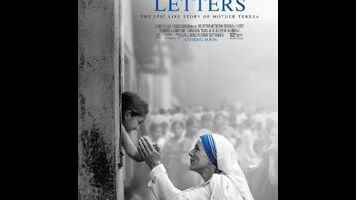Writer-director-producer William Riead started working on his biopic of Mother Teresa in the wake of the terrorist attacks of 9/11, believing that the best way to recover from an act of unfathomable hate was to spend his time telling the story of someone who lived a life of unconditional generosity. Although not especially religious, Riead spent over a decade researching his subject, and raising money. Along the way he discovered that Mother Teresa had more complicated feelings about her calling than he’d expected. But he still went on to make a blandly positive biopic, with the crude shape of a melodrama, but none of the passion. The Letters feels dutiful, not artful.
The title comes from a cache of correspondence between Mother Teresa and Celeste Van Exem, a Jesuit priest to whom she confessed her feelings of being isolated from God. The Skopje-born nun began her mission in the Calcutta slums in 1948, after experiencing what she referred to as “the call within the call,” which provoked her to leave her Darjeeling convent and work among India’s untouchables. But as the program picked up steam, Mother Teresa found it difficult to avoid publicity and controversy. And the hassle of it all led her to doubt.
Curiously—especially given its name—The Letters barely touches on the letters themselves. Riead employs a framing device that has Rutger Hauer as a priest researching Mother Teresa’s qualifications for beatification, during the course of which he conducts a long interview with Van Exem (played by Max Von Sydow in the present day and Aapo Pukk in the past). That sets in motion a long flashback, occasionally narrated by the elderly Van Exem, primarily covering the years in between the beginning of Mother Teresa’s ministry and the international recognition that sprang from it. Then, in the last 15 minutes or so, Riead crams in his heroine’s Nobel Peace Prize, and briefly touches on how her alienation made her commitment to the impoverished and diseased all the more laudable.
Riead’s greatest asset in The Letters is his star, Juliet Stevenson, who plays a difficult role with real poise. She does an accent—Eastern European, with the inflection of someone who’s spent most of her life in India—but doesn’t make a big show of it. And she’s resolutely unglamorous without adopting any kind of broad pose. Most importantly, she refuses to present the saintly version of Mother Teresa, spreading peace and touching hearts. Her version of humanitarianism is always a little curt and a little cold.
But the movie surrounding Stevenson doesn’t take its cues from her performance. Riead stacks up scenes of simplistic conflict: a sniffy nun trying to keep Mother Teresa from getting her mission approved; angry Calcuttans complaining that “this Christian woman” is going to try to convert their children; a morally questionable foreign correspondent ignoring her demands that he write about something else; and so on. Meanwhile, the near wall-to-wall uplifting synthesizer score, playing behind montages of the sick and uneducated flocking to Mother Teresa, pushes toward overkill.
It’s probably unfair to compare The Letters to the classics, but it’s hard not to think about the more ambitious (and bigger-budget) movies The Nun’s Story and Gandhi throughout. The former’s more docu-realistic, and more subtle about what a religious woman does when she fears that her philanthropic impulses are running counter to God’s will; the latter’s more savvy about India as a staging ground for post-colonial cultural conflict. The Letters, on the other hand, can’t even adequately explain how Mother Teresa inspired so many disciples, or why she’s still a divisive figure after all that she accomplished. This film is akin to a juvenile biography, skimmed through by middle-schoolers writing a book report. And sometimes, it’s like the book report.

